Son of Hamas Leader at JPost Conf: “there is an Islamic problem”
Plus Other Noteworthy Moments from the Jerusalem Post NYC Conference
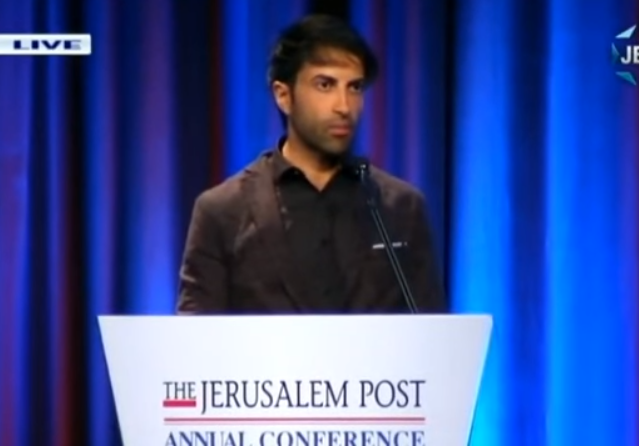
This past Sunday more than 1,500 people—along with dozens of members of the media and press—attended The Jerusalem Post’s 5th Annual Conference in New York City.
The one-day event, themed “Israel, the U.S. and the Free World Facing Global Terror,” was held at the Marriot Marquis Hotel in the heart of Times Square and Manhattan’s theater district.
According to the pre-conference publicity, the annual conference—which in the past has proved to be “both newsworthy and dazzling”—was predicted to be the “best and biggest yet”.
It was indeed.
Hosted by Steve Linde, outgoing Editor-in-Chief of The Jerusalem Post and Yaakov Katz, his soon-to-be replacement, the gala gathering featured speeches, panels, and interviews on stage with government ministers, veteran diplomats and journalists, Israeli military and security experts, and the heads of various Jewish American and Israeli NGOs. Thrown in was also some pretty terrific “star power”.
Below are my picks of the conference’s five most memorable moments.
1. The “Green Prince”: Humanity Faces an “Islamic Problem”
Mosab Hassan Yousef—known as the “Green Prince”—spoke before lunch, bringing the crowd to its feet in a standing ovation.
The son of West Bank Hamas leader Sheikh Hassan Yousef, he operated as an agent for the Shin Bet (Israel’s Security Agency) from 1997-2007. For a decade, he reportedly provided Israel with key intelligence for counterterror operations.
Basically, Yousef masqueraded as his father’s successor, and was groomed to lead Hamas’s political wing, all the while exposing the group’s terrorist tactics to Israeli security forces.
According to security sources, Yousef was “Israel’s most secret weapon in its war against Hamas for a decade, foiling dozens of terrorist attacks”.
He fled to the U.S. in 2007, where he was granted political asylum. Today he’s a convert to Christianity and frequently speaks out publicly against Hamas.
Already having achieved considerable notoriety from a best-selling 2010 autobiography and an award-winning 2014 documentary, I knew about Yousef before the conference.
But I hadn’t had the chance to hear him in person. For me (and based on the comments of my tablemates during lunch, for many others in the audience), Yousef’s address was one of the day’s most unforgettable.
In his striking speech, the most remarkable part was when he spoke of the “collective mind” of Palestinian society. He recounted witnessing a Palestinian mother send her five children on suicide attacks, blessing each one. To Yousef it signifies an
ideology, a culture, a state of consciousness that is stuck in the 6th and 7th centuries in a tribal lust for power”.
Yousef didn’t mince words: “We cannot fool ourselves, there is an Islamic problem”. Adding that people from other religions don’t act this way, Yousef listed various terrorist organizations—Hamas, Hezbollah, Boko Haram, ISIS—that are “all killing in the name of Allah”.
But Yousef didn’t just call out the heinous brutality of the radical Islamists. He also berated President Obama for his “political correctness” and for failing to “face the threat with courage”. In Yousef’s account:
When the president of the free world stands and says ‘Islam is the religion of peace’ he creates the climate to create more terrorism”.
Here’s Yousef’s 20 minute speech. It’s well-worth the time to watch the whole thing:
2.Gilad Erdan: G4S Was Pressured by BDS to Quit Israel
During the 8-hour-long conference a number of speakers zeroed in on the boycott, divestment, and sanctions (BDS) movement. A panel, “The future of the Jewish people and the war against BDS”, was also devoted to the issue. The participants made some important points:
@AdamMilstein talking about fighting #BDS at #jpostnyc2016:it's not going away it's getting stronger pic.twitter.com/ZbqD5rTPKF
— Dana Somberg (@danasomberg) May 22, 2016
Lauder: A vote against Israel at the UN is a vote against the U.S. #Jpostnyc2016
— Eytan Sosnovich (@EytanSosnovich) May 22, 2016
Lauder: SJP little more than a recruiting tool for Muslim Brotherhood #Jpostnyc2016
— Eytan Sosnovich (@EytanSosnovich) May 22, 2016
Lauder: we will mobilize alums & donors w/lists of colleges who give cover to profs who "parrot jihadist talking points" #BDS #jpostnyc2016
— Miriam F. Elman (@MiriamElman) May 22, 2016
Erdan – no politics when it comes to fighting BDS. No Labor or Likud. We need to be united. #jpostnyc2016
— Yaakov Katz (@yaakovkatz) May 22, 2016
Erdan at #Jpostnyc2016 on fight vs #BDS: We have truth on our side and that is why we will prevail.
— Gil Hoffman (@Gil_Hoffman) May 22, 2016
MK Erdan: govts must stop online incitement if internet providers won't do it. "I am sickened by children being taught 2 hate" #JPostNYC2016
— Miriam F. Elman (@MiriamElman) May 22, 2016
MK Erdan: #BDS & terrorism share objectives & fuel each other. The victims are Palestinians who lose jobs. "we want dialogue" #JPostNYC2016
— Miriam F. Elman (@MiriamElman) May 22, 2016
But one of the most newsworthy moments was MK Gilad Erdan’s remarks about the company G4S. Erdan, who serves as Minister of Public Security and Minister of Strategic Affairs and Public Diplomacy, said that BDS pressure was a factor in the decision by G4S to sell its operation in Israel.
Calling this a mistake, both morally and financially, Erdan intimated that the company would “pay a price” for its actions.
Targeted by anti-Israel activists for some years, G4S has publicly claimed that its decision to move out of the Israeli market had nothing to do with BDS.
BREAKING: Erdan: I "personally know"… "BDS was a factor in decision of …@G4S to sell their business in Israel." #jpostnyc2016 @cerenomri
— Eugene Kontorovich (@EVKontorovich) May 22, 2016
.@giladerdan1 reveals that Israel has info that @G4S pullout due to pressure from anti-Israel boycott campaign #jpostnyc2016 @Yair_Rosenberg
— Eugene Kontorovich (@EVKontorovich) May 22, 2016
MK Erdan confirms: G4S quit #Israel due to #BDS pressure. A mistake morally. The company will pay a financial price #JPostNYC2016
— Miriam F. Elman (@MiriamElman) May 22, 2016
Apparently, Erdan is privy to some other information which the company has been loath to share publicly.
3. Efraim Halevy: “Now Is the Time to Talk with Hamas”
Many of the JPost conference presenters focused on Israel’s security challenges.
One of the more impressive speeches was by Transportation and Intelligence Minister Israel Katz. Like others on Sunday, he discussed how Israel is handling Hezbollah’s military build-up and Hamas’s tunnel infrastructure.
But in his address he also described a new project underway to “connect 2 million Gazans to the world” via the creation of an artificial island five kilometers off of Gaza’s coast. The island would serve as a port for the Palestinians—a new trading hub and a gateway for people to leave and enter Gaza “without risking Israel’s security”.
Stating that “it’s about time to disengage these people from Israel”, Katz’s idea—which is surprising given his vigorous opposition to Israel’s disengagement from the Gaza Strip in 2005—is both innovative and strategically sound.
By contrast, and frankly, in some of the most shocking and bizarre remarks of the conference, Former Mossad Chief Efraim Halevy suggested that “now is the time to talk to Hamas”.
On a roundtable devoted to the question “Does the world have an answer to Islamic terror?”, Halevy said that the Hamas leadership “knows they have no chance of destroying Israel”. As a result, he argued that Israel should engage with it in a dialogue.
He said that he “wouldn’t be surprised” if it was the next Defense Minister, Avigdor Liberman, who would be the one to initiate these talks.
Further, Halevy claimed that Israel “doesn’t need to fear the influence of Iran over Hamas” because “Hamas is no longer linked to Iran” and is looking for ways to reach out to Israel.
Former IDF Chief of Staff Gabi Ashkenazi, who is viewed as a possible contender for the job of prime minister in the near future, strongly disagreed with Halevy:
I don’t think we can talk to Hamas. Hamas do not recognize Israel. They are an enemy state and we should treat them as an enemy.”
Ashkenazi conceded that ways could be found to ease the “pressure on the population” in Gaza. But he insisted that “we cannot compromise with terror”.
Former IDF Chief of Staff Gabi Ashkenazi addresses #JPostNYC2016.#Israel #Jewish #IDF pic.twitter.com/grJDzKhYoH
— (((Joel Leyden))) (@joelleyden) May 22, 2016
Finally some faint boos at JPost Conference (when Halevy says Hamas is seeking dialogue with Israel)
— Chemi Shalev (@ChemiShalev) May 22, 2016
Efraim Halevy: #Hamas isn't linked to #Iran & wants to talk w/#Israel. Ashkenazi: no talking until they accept our presence #jpostnyc2016
— Miriam F. Elman (@MiriamElman) May 22, 2016
In rejecting Halevy’s recommendation, Ashkenazi was joined by others featured on the panel: Likud MK Dr. Anat Berko, a former IDF Lieutenant Colonel and expert on terrorism, and Malcolm Hoenlein, the executive vice chairman of the Conference of Presidents of Major American Jewish Organizations.
A few months ago Berko came in for ridicule for saying that there’s never been an Arab state of Palestine because Arabic has no letter “P”. Her remarks then were misconstrued, but her comments on Sunday were pitch-perfect.
At one point she noted that Hamas jihadists were like drug addicts—junkies who have an enthusiasm for political violence and are constantly looking for their next fix.
It’s an apt metaphor.
She also raised the good point that Hamas couldn’t afford to negotiate with Israel, since by doing so it would lose its very reason for being.
Hoenlein for his part took issue with Halevy’s claim that “Hamas is adrift from Iran”. In Hoenlein’s view “Hamas is Iran”. Although perhaps overstated, that’s fairly consistent with other analyses (see, for example, here and here).
4. Michael Douglas: I Want to be Part of This Tribe
Editor-in-chief Steve Linde’s interview with two-time Academy Award winner Michael Douglas was a special treat.
The recipient of last year’s Genesis Prize, Douglas described his work with Israel’s Jewish Agency chairman Natan Sharansky, including a three-campus speaking tour to counter anti-Semitism and promote a positive identity for Jewish students on campus. (Douglas didn’t mention the attempt by anti-Israel activists at Brown to shut his event down; we covered those efforts here).
During Douglas’s time on the stage he revealed a lot about his commitment to, and love for, Judaism, the Jewish people, and Israel. He also shared some stories about his father than I never knew: Kirk Douglas experienced a spiritual awakening after surviving a helicopter crash nearly 30 years ago. Becoming a bar-mitzvah at 83, today at age 99 he has fully re-embraced his Jewish roots.
Michael Douglas: 'I wanted to be part of this tribe. I love these Jewish values.' #jpostnyc2016 pic.twitter.com/7S8eRp5miD
— Zionist Federation of Australia (@ZionistFedAus) May 22, 2016
Michael Douglas at #jpostnyc2016: when I light Shabbat candles Friday night, my soul feels alive.
— Yaakov Katz (@yaakovkatz) May 22, 2016
LIVE on stage now #michaeldouglas at #JPostNYC2016 https://t.co/tWSGMh5dxR pic.twitter.com/th0neYgJgM
— The Jerusalem Post (@Jerusalem_Post) May 22, 2016
Douglas also didn’t mind sharing some thoughts about the presidential election. He admitted being a lifelong Democrat and a supporter of the Clintons. But he also said that he knows Donald Trump, plays golf with him and “if you don’t talk politics and religion you can get along with anyone”.
5. Roni Levi: Special Individuals in the Israel Defense Forces
Many speakers on Sunday spoke about Israel’s robust democratic institutions. Separation of powers, an independent judiciary, and peaceful transfers of power are good indicators of healthy democratic governance. But the measure of any democracy is the extension of rights to the most vulnerable of its citizenry.
Like to people with special needs.
Among the most remarkable moments of Sunday’s conference was the brief award ceremony for this year’s Jerusalem Post Social Affairs Prize winner. The recipient was “Special in Uniform”, a program designed to integrate young Israelis with intellectual disabilities into the IDF. A short film highlighted the program for the audience, and its exceptional contribution to enable persons with autism and other special needs to serve alongside their peers.
To date, there are over 250 participants in the program with nine military bases across the country taking part. Plans to enlarge the program so that it reaches 1,000 participants by 2020 are now underway.
Following the film, one of these amazing youngsters—Sergeant Roni Levi—came up on stage to receive the award. He was flanked by Lt. Col. Almog, Chairman of the program, and Yossi Kahana, Director of the Jewish National Fund’s Task Force on Disabilities.
Levi was obviously overwhelmed by the experience and could say no more than an embarrassed thank you. But Almog and Kahana didn’t miss a beat—they quickly took over for him and finished his speech.
It was a uniquely touching and tender moment.
Runners Up
It was incredibly hard to select my top 5 unforgettable moments from this outstanding conference. There was a lot of good information and opinion being imparted from a strong line-up of noteworthy speakers.
So, here’s some honorable mentions:
PM Benjamin Netanyahu took time away from his busy schedule forming a new governing coalition (see below) to deliver a characteristically first-rate address:
Netanyahu at Jpost Conference: PA inciting to kill Jews https://t.co/C7CPFioys6
— Israel News (@IsraelNewsNow) May 22, 2016
Veteran diplomat Dennis Ross and ambassador to the U.S. Ron Dermer also delivered an excellent set of remarks, underscoring the failures of the Obama administration’s Middle East policies (see a recap of Ross’ speech here and Dermer’s address here).
Dennis Ross: every US administration that distanced from #Israel gained nothing w/Arabs. Ross giving a good history lesson #jpostnyc2016
— Miriam F. Elman (@MiriamElman) May 22, 2016
I’d also be remiss if I didn’t give a brief shout-out to the outstanding women on the program, each of which contributed to the success of Sunday’s conference.
Social Equality Minister Gila Gamliel offered a comprehensive review of Israel’s 5 year plan to reduce socio-economic gaps. As Gamliel explained, a 15 billion shekel allocation will strengthen both the country’s peripheral regions and the earning power of minority groups, including Arab Israelis.
Dr. Ruth Westheimer, best-selling author, TV personality and sex therapist regaled the audience, offering some unexpected free advice.
Not something you get to hear every day. Dr. Ruth talking about first sexual experience on Kibbutz in Israel. #jpostnyc2016
— Yaakov Katz (@yaakovkatz) May 22, 2016
Dr. Ruth talks with Steve Linde at #JPostNYC2016.#Israel #Jewish #IDF #sex #Zionism pic.twitter.com/6z9zk3n0Rw
— (((Joel Leyden))) (@joelleyden) May 22, 2016
And the always awesome Caroline B. Glick, senior contributing editor of The Jerusalem Post, delivered a marvelous closing speech. Stating that as a journalist she needn’t be diplomatic, she used her address to “name names”, slamming the American journalists who’ve destroyed the profession:
Caroline Glick wraps up #jpostnyc2016: says she'll name names & starts w/"fiction writer" #Rhodes: "destroyed the profession of journalism"
— Miriam F. Elman (@MiriamElman) May 22, 2016
Caroline Glick: reading #Rhodes I couldn't believe the triumphalism of it. Tells audience: be truth seekers #jpostnyc2016
— Miriam F. Elman (@MiriamElman) May 22, 2016
Caroline Glick: continues to name names. Next up: #ploughshares. Tells audience: Americans need to filter out lies/propaganda posing as fact
— Miriam F. Elman (@MiriamElman) May 22, 2016
It was the perfect way to wrap-up a conference hosted by a venerable paper that has always successfully aimed to be an “accurate, reliable, and objective” news source.
Conclusion
The JPost 2016 Annual Conference happened to coincide with a dramatic shakeup in Israeli politics: the resignation of Defense Minister Moshe Ya’alon last week, his abrupt and bitter departure from political life, and the expectation that former Foreign Minister Avigdor Liberman will take his place.
The central figure of #jpostnyc2016 conf. today is likely to be someone who is not there. #MosheYa'alon
— David Brinn (@davidbjpost) May 22, 2016
At the time of this writing the negotiations haven’t been finalized. Once they are, it will bring Liberman’s five-seat Yisrael Beytenu political party into what has been a razor-thin governing coalition.
According to Netanyahu, a wider coalition is necessary for both economic progress, and to advance peace and security. But his decision to appoint the hawkish, brash, and unpredictable Liberman as Israel’s new defense minister has met withering criticism from across the political spectrum—and in the U.S. as well (see here and here).
None of that was on display at the Marriot Marquis though.
There, one speaker after the next heaped praise on the departing Ya’alon while also recommending that Liberman be given the opportunity to succeed.
Ashkenazi: Lieberman was pragmatic as foreign minister and appreciates US-Israel relations
— Nathan Guttman (@nathanguttman) May 22, 2016
Gamliel compares Liberman to Ariel Sharon. Says "judge by deeds". Says Ya'alon departure is loss to country. #jpostnyc2016
— Yaakov Katz (@yaakovkatz) May 22, 2016
If I sum up so far – Liberman is getting lots of love from Likud ministers. Erdan & Gamliel both saying give him chance. #jpostnyc2016
— Yaakov Katz (@yaakovkatz) May 22, 2016
Here’s a clip of Erdan speaking to the issue, where he mocks those who are “yelling and screaming that the end of the world is near” because Liberman will be the next defense minister:
Some conference speakers—like MK Anat Berko—refused to “talk politics”, insisting that the program stay on script.
Meanwhile, former Interior and Education Minister Gideon Sa’ar, who is also seen as a future prime-ministerial candidate, chose not to mention either Liberman or Ya’alon.
But he did use his few minutes at the podium to rebuke Netanyahu for his de facto building freeze in Jerusalem. Sa’ar warned that if Israel didn’t substantially increase affordable housing construction in Jerusalem and entice Jews to stay in the capital, an Arab majority there would emerge in some 15 years.
Speaking to a cheering crowd, Sa’ar said that Netanyahu had to change course and act swiftly so as not to “lose Jerusalem for future generations”. And in a gutsy move, he called on the frontrunners in the US presidential campaign to pledge their support for Israel’s right to build in its capital.
Gideon Saar – battle for Jerusalem will be fought on the ground. There is currently building freeze in capital but not for Palestinians.
— Yaakov Katz (@yaakovkatz) May 22, 2016
Former Likud Minister Gideon Saar calls on both presidential candidates to recognize Israel’s right to build freely in Jerusalem
— Chemi Shalev (@ChemiShalev) May 22, 2016
Bottom line: this conference managed to pack in an enormous amount in one day. There was plenty of controversy, some tender moments, and a few bombshells. I’m already looking forward to #jpostnyc2017!
[Featured Image taken from this tweet]
Miriam F. Elman is an associate professor of political science at the Maxwell School of Citizenship & Public Affairs, Syracuse University. She is the editor of five books and the author of over 60 journal articles, book chapters, and government reports on topics related to international and national security, religion and politics, the Middle East, and the Israeli-Palestinian conflict. She also frequently speaks and writes on the Boycott, Divestment, and Sanctions (BDS) anti-Israel movement. Follow her on Twitter @MiriamElman
 DONATE
DONATE
Donations tax deductible
to the full extent allowed by law.


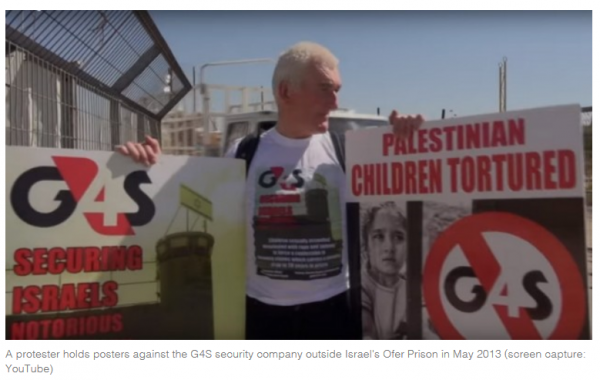
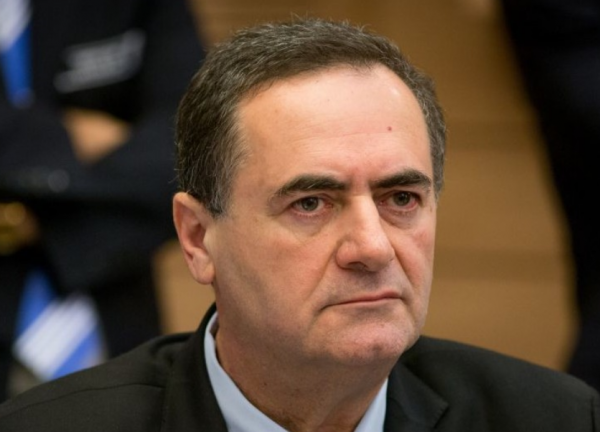
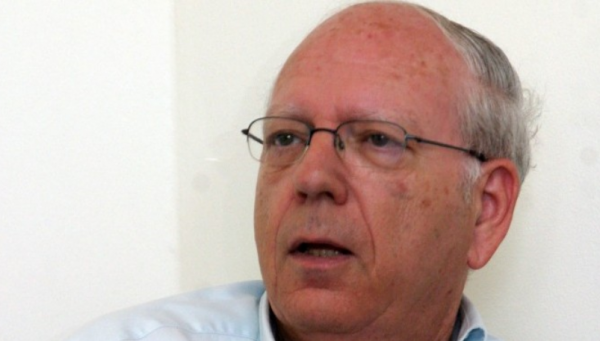
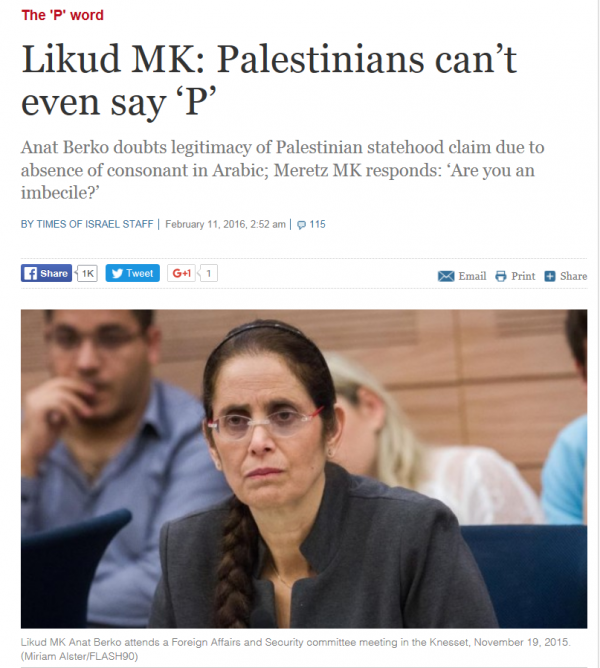
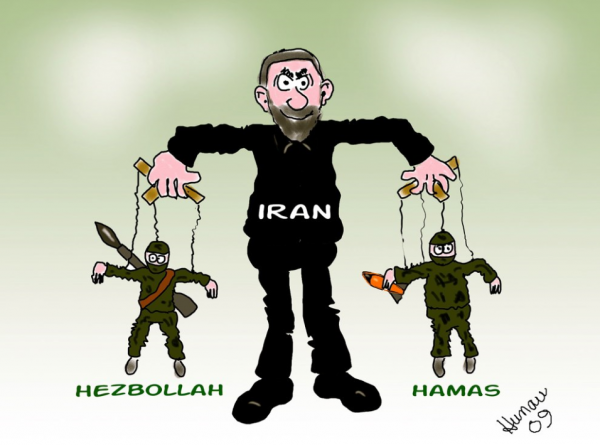

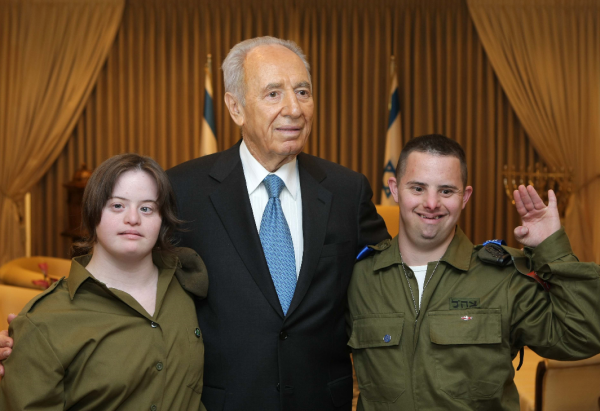
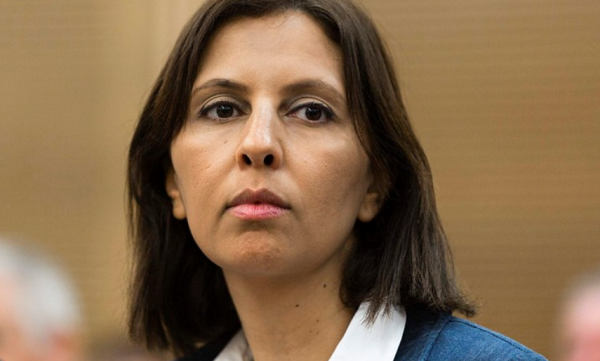
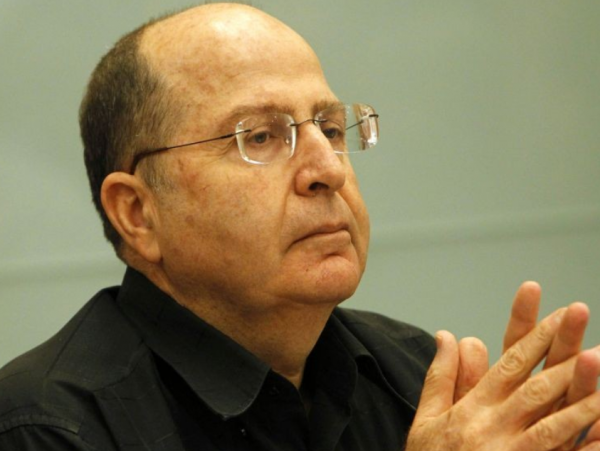
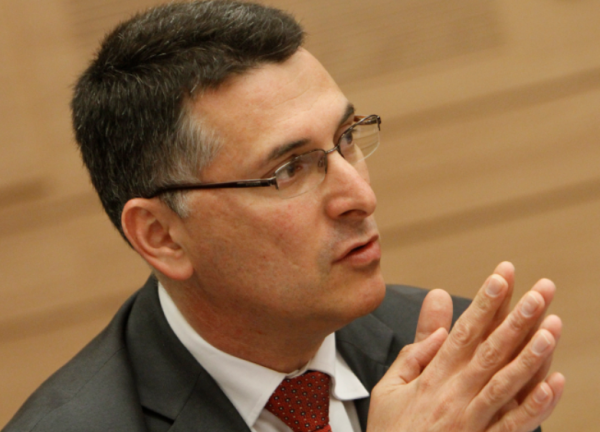







Comments
As a former Israeli terrorist who participated in public bombings of hotels serving the British – I do not think that Dr. Ruth has any Moral Authority to condemn terrorism.
I’m guessing that you think the US has no right to respond with violence to those who attack us with violence?
Or that even though we faced enormous casualties if we had invaded Japan we had no right to drop an atomic bomb because they didn’t drop one on us?
There’s a bit of some smug judgmentalism there bud. You have no idea why she did what she did. I know that they were fighting for their very lives because if they had lost they would have all been murdered. And besides terrorism is generally considered attacks on non combatants/children. I doubt that anyone fighting for Israel targetted children. Some may have dies but not as the main purpose of any attack. Can the Palis say the same? or the 5 armies that were arrayed against Israel?
You need to stop listening to Socialist and anti Semitic propaganda.
Your moral relativism absolves us from taking you seriously, too.
Wow! The balls on Mosab Hassan Yousef.
He faced a really bad end if he had been discovered.
May God bless him and keep him and his family safe.
Yousef must have enviable security provided to him to now be speaking publicly. We need a few more like him.
And I thought I read a few years ago that Michael Douglas followed his father into a deeper reach towards Judaism because of some of the pain in his life (divorce, cancer, and especially his son). Good to see he also is bucking the Hollywood trend and being public about it.